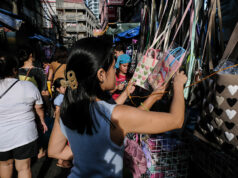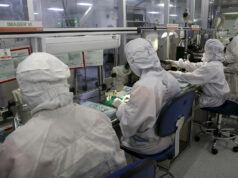By Kyle Aristophere T. Atienza and Vann Marlo M. Villegas, Reporter
Military to keep order in vaccine drive — Duterte
President Rodrigo R. Duterte has ordered the military and police to keep order as the government starts vaccinating Filipinos against the coronavirus next week.
The President during a televised meeting with officials leading the fight against the pandemic on Monday night also asked communist rebels not to hamper the transport of vaccines nationwide.
The rebels should allow the vaccines “to be transported freely and safely,” Mr. Duterte said. “It would be nice to see the military and police also helping out.”
He said police stations and military camps could be used as vaccination sites in the countryside. Public schools and gymnasiums will also be used as vaccination facilities, he added.
Vaccine czar Carlito G. Galvez, Jr. said military hospitals would be used as vaccination centers for soldiers and their families.
The Communist Party of the Philippines in a statement said the New People’s Army, its armed wing, would ensure COVID-19 are given “a humanitarian corridor for safe and unimpeded passage in guerrilla bases and zones.”
But the Maoist group said the Philippine Red Cross and other civilian humanitarian agencies should be the ones to handle the transportation and distribution of vaccines, not the military.
“It’s better that COVID-19 vaccines are not transported in military vehicles, especially those which are not properly marked and carrying armed soldiers,” it said.
It also accused the military of carrying out combat and psywar operations behind the veil of implementing coronavirus restrictions.
Presidential spokesman Harry L. Roque, Jr. ignored the suggestion, saying the government does not listen to the advice of a terrorist group.
Armed Forces Chief of Staff Cirilito E. Sobejana said the military is ready to deploy soldiers to help in the vaccination drive. All land, air, and water assets of the military would be used, he added.
“We will actively aid the Department of Health (DoH) in our vaccination rollout considering that we are strategically deployed,” he told a televised briefing in Filipino.
The first batch of vaccines developed by Pfizer, Inc. is expected to arrive this month.
DoH reported 1,235 coronavirus infections on Tuesday, bringing the total to 540,227. The death toll rose by 65 to 11,296, while recoveries increased by 53 to 499,764, it said in a bulletin.
There were 29,167 active cases, 88.6% were mild, 5.5% did not show symptoms, 2.7% were critical, 2.6% were severe and 0.61% were moderate.
The DoH said three duplicates had been removed from the tally, while 59 recovered cases were reclassified as deaths. Eight laboratories failed to submit their data on Feb. 8.
More than 7.6 million Filipinos have been tested for the coronavirus as of Feb. 7, according to DoH’s tracker website.
The coronavirus has sickened about 107 million and killed about 2.3 million people worldwide, according to the Worldometers website, citing various sources including data from the World Health Organization (WHO).
About 78.9 million people have recovered, it said.
Meanwhile Health Undersecretary Maria Rosario S. Vergeire said the Pfizer vaccines would also be given other health institutions including facilities in Davao and Cebu.
The vaccines would also be sent to coronavirus referral hospitals, big hospitals in local governments and five private hospitals in Metro Manila, she told CNN Philippines.
DoH earlier said workers at referral hospitals Philippine General Hospital, Lung Center of the Philippines, East Avenue Medical Center, Dr. Jose N. Rodriguez Memorial Hospital and Sanitarium would be prioritized for vaccine shots.
The Philippines expects to take delivery of at least 5.6 million doses of vaccines from Pfizer, Inc. and AstraZeneca Plc this quarter under a global initiative for equal access.
At least 117,000 doses of Pfizer vaccines are expected to arrive in the middle of the month.
Mr. Galvez on Sunday said the government could vaccinate as many as 70 million citizens by yearend.
The vaccination target might have to be delayed until the middle of next year in case of supply shortage.
Meanwhile, Speaker Lord Allan Q. Velasco has filed a resolution urging the government to boost health monitoring by creating a “unified national contact tracing protocol.”
The protocol should allow the state to transmit encrypted data and provide real-time data to accredited contact tracing apps.
He also called for a centralized data system. “There is poor interconnection and data sharing between solution providers and the central database maintained by the Department of Health, Mr. Velasco said. — with Gillian M. Cortez



